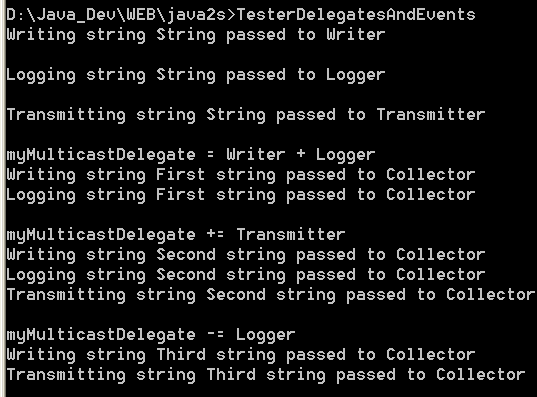Define your own delegate

/*
Learning C#
by Jesse Liberty
Publisher: O'Reilly
ISBN: 0596003765
*/
using System;
namespace DelegatesAndEvents
{
class MyClassWithDelegate
{
// The delegate declaration.
public delegate void StringDelegate(string s);
}
class MyImplementingClass
{
public static void WriteString(string s)
{
Console.WriteLine("Writing string {0}", s);
}
public static void LogString(string s)
{
Console.WriteLine("Logging string {0}", s);
}
public static void TransmitString(string s)
{
Console.WriteLine("Transmitting string {0}", s);
}
}
public class TesterDelegatesAndEvents
{
public void Run()
{
// Define three StringDelegate objects.
MyClassWithDelegate.StringDelegate
Writer, Logger, Transmitter;
// Define another StringDelegate
// to act as the multicast delegate.
MyClassWithDelegate.StringDelegate
myMulticastDelegate;
// Instantiate the first three delegates,
// passing in methods to encapsulate.
Writer = new MyClassWithDelegate.StringDelegate(
MyImplementingClass.WriteString);
Logger = new MyClassWithDelegate.StringDelegate(
MyImplementingClass.LogString);
Transmitter =
new MyClassWithDelegate.StringDelegate(
MyImplementingClass.TransmitString);
// Invoke the Writer delegate method.
Writer("String passed to Writer\n");
// Invoke the Logger delegate method.
Logger("String passed to Logger\n");
// Invoke the Transmitter delegate method.
Transmitter("String passed to Transmitter\n");
// Tell the user you are about to combine
// two delegates into the multicast delegate.
Console.WriteLine(
"myMulticastDelegate = Writer + Logger");
// Combine the two delegates; assign the result
// to myMulticastDelegate
myMulticastDelegate = Writer + Logger;
// Call the delegated methods; two methods
// will be invoked.
myMulticastDelegate(
"First string passed to Collector");
// Tell the user you are about to add
// a third delegate to the multicast.
Console.WriteLine(
"\nmyMulticastDelegate += Transmitter");
// Add the third delegate.
myMulticastDelegate += Transmitter;
// Invoke the three delegated methods.
myMulticastDelegate(
"Second string passed to Collector");
// Tell the user you are about to remove
// the Logger delegate.
Console.WriteLine(
"\nmyMulticastDelegate -= Logger");
// Remove the Logger delegate.
myMulticastDelegate -= Logger;
// Invoke the two remaining delegated methods.
myMulticastDelegate(
"Third string passed to Collector");
}
[STAThread]
static void Main()
{
TesterDelegatesAndEvents t = new TesterDelegatesAndEvents();
t.Run();
}
}
}
Related examples in the same category